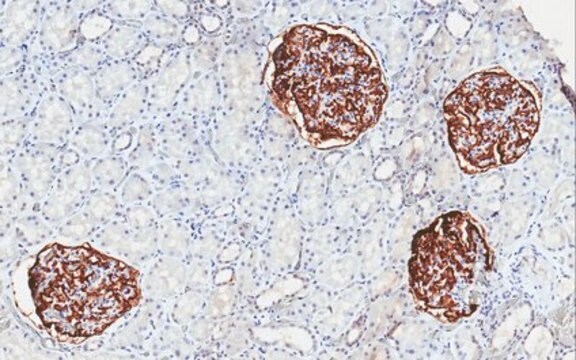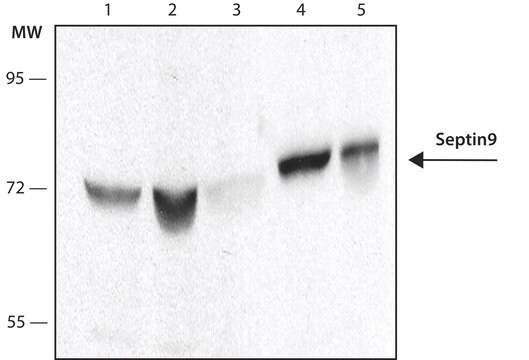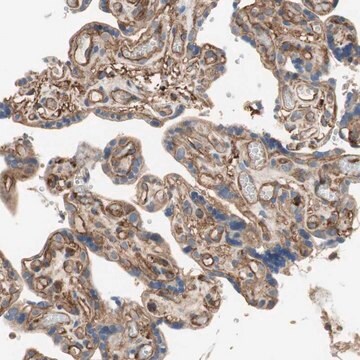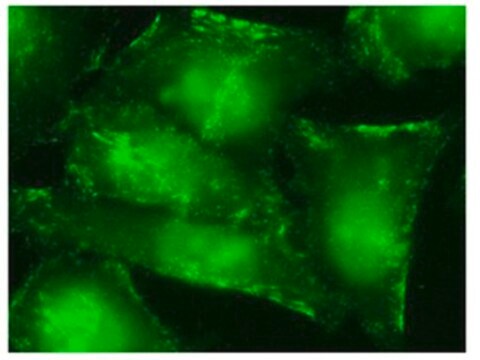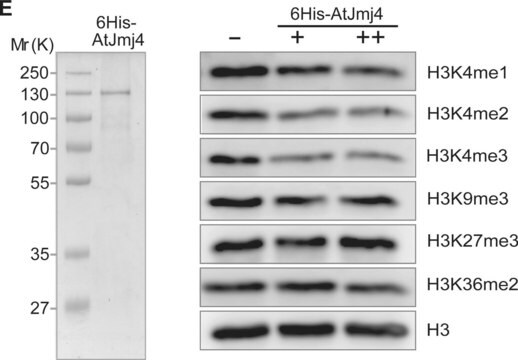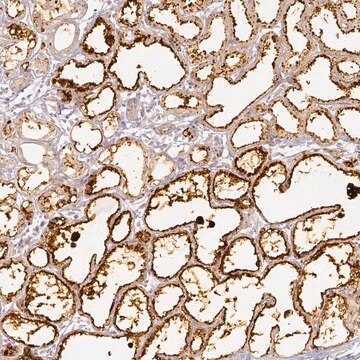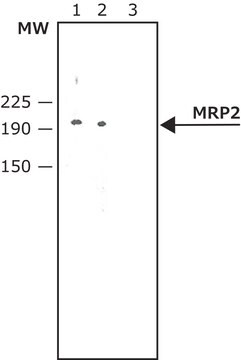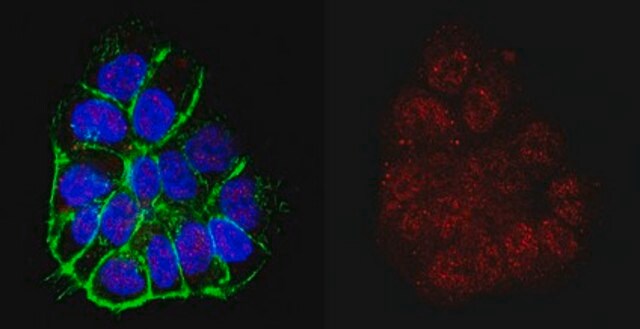推薦產品
生物源
mouse
品質等級
抗體表格
purified antibody
抗體產品種類
primary antibodies
無性繁殖
10C10, monoclonal
物種活性
human
技術
immunocytochemistry: suitable
immunoprecipitation (IP): suitable
western blot: suitable
同型
IgG1κ
NCBI登錄號
UniProt登錄號
運輸包裝
wet ice
目標翻譯後修改
unmodified
基因資訊
human ... SEPTIN9(10801)
一般說明
Septin-9 (UniProt Q9UHD8; also known as MLL septin-like fusion protein, MLL septin-like fusion protein MSF-A, Ovarian/Breast septin, Ov/Br septin, SeptD1, Septin D1) is encoded by the SEPT9 (also known as AF17q25, KIAA0991, MSF, MSF1, PNUTL4, SINT1) gene (Gene ID 10801) in human. Septins are GTPases capable of forming higher-order oligomers and filamentous polymers that contact with cell membrane and cytoskeleton. Septins are involved in various cellular processes, including cytokinesis, karyokinesis, exocytosis, and cell shape maintenance. Septins exist in complexes that are composed of ordered non-polar arrays of multiple different septins. Human genome contains 13 septin genes that are grouped into the SEPT2 subgroup (septins 1, 2, 4, and 5), the SEPT6 subgroup (septins 6, 8, 10, 11, and 14), the SEPT3 subgroup (septins 3, 9, and 12), and the SEPT7 subgroup (septin 7). Among mammalian septins, septin-9 undergoes the most alternative splicings, alteration in septin-9 isoforms expression has been linked to cancer and SEPT9 gene mutations have been linked to hereditary neuralgic amyotrophy. Cdk1-catalyzed septin-9 Thr24 phosphorylation is reported to promote septin-9 interaction with the peptidylprolyl isomerase Pin1. Genetic knockdown of either protein results in abscission defect during cell division.
特異性
Clone 10C10 specifically detected purified recombinant human Septin-9, but not recombinant Spetin-1, -2, -5, -6, -7, -8. -9. -11, or -12, by Western blotting (Estey, M.P., et al. (2010). J. Cell Biol. 191(4):741-749). The epitope has been mapped to region present in human Septin-9 spliced isoforms 1 (Epsilon, MSF-A), 2 (Alpha), 5 (Gamma), and 7, but absent in spliced isoforms 3 (Beta, MSF-B), 4 (Delta), 8, and 9 reported by UniProt (Q9UHD8).
免疫原
Epitope: Internal (N-terminal half).
His-tagged recombinant human septin-9.
應用
Immunocytochemistry Analysis: A representative lot detected septin-9 immunoreactivity in U2OS cells (Courtesy of Dr. William S. Trimble, University of Toronto, Canada).
Immunocytochemistry Analysis: Clone 10C10 hybridoma culture supernatant immunostained intracellular septin-9 in hTERT-immortalized retinal pigment epithelial (hTERT-RPE) cells (Courtesy of Dr. William S. Trimble, University of Toronto, Canada).
Immunocytochemistry Analysis: A representative lot detected septin-9 immunoreactivity colocalized with septin-2 and septin-11 at the cleavage furrow in anaphase and the midbody in telophase HeLa cells (Estey, M.P., et al. (2010). J. Cell Biol. 191(4):741-749).
Immunoprecipitation Analysis: A representative lot immunoprecipited septin-9 from mitotically arrested HeLa cells following nocodazole (Cat. No. 487928) treatment. Cdk1 inhibition by Roscovitine (Cat. No. 57360) treatment or siRNA-meidated Cdk1 knowndown diminished the phosphroylation of the immunoprecipitated septin-9 (Estey, M.P., et al. (2013). J. Biol. Chem. 288(42):30075-30086).
Immunoprecipitation Analysis: A representative lot immunoprecipitated significantly more septin-9 from unsynchronized than from mitotically synchronized HeLa cells, the difference was normalized following siRNA-mediated Pin1 knockdown (Estey, M.P., et al. (2013). J. Biol. Chem. 288(42):30075-30086).
Western Blotting Analysis: A representative lot specifically detected recombinant septin-9 spliced isoforms and fragments that contain the epitope region sequence, but not recombinant isoforms or fragments lacking the epitope (Estey, M.P., et al. (2013). J. Biol. Chem. 288(42):30075-30086).
Western Blotting Analysis: A representative lot specifically detected purified recombinant human septin-9, but not purified recombinant spetin-1, -2, -5, -6, -7, -8. -9. -11, -12 (Estey, M.P., et al. (2010). J. Cell Biol. 191(4):741-749).
Western Blotting Analysis: A representative lot detected the presence of co-precipitated septin-9 in septin-2 immunoprecipitates from HeLa cell lysates (Estey, M.P., et al. (2010). J. Cell Biol. 191(4):741-749).
Note: For Western blotting application, prior enrichment of septin-9 by immunoprecipitation or other purification methods is highly recommended. Clone 10C10 is not recommended for probing septin-9 using whole cell lysates.
Immunocytochemistry Analysis: Clone 10C10 hybridoma culture supernatant immunostained intracellular septin-9 in hTERT-immortalized retinal pigment epithelial (hTERT-RPE) cells (Courtesy of Dr. William S. Trimble, University of Toronto, Canada).
Immunocytochemistry Analysis: A representative lot detected septin-9 immunoreactivity colocalized with septin-2 and septin-11 at the cleavage furrow in anaphase and the midbody in telophase HeLa cells (Estey, M.P., et al. (2010). J. Cell Biol. 191(4):741-749).
Immunoprecipitation Analysis: A representative lot immunoprecipited septin-9 from mitotically arrested HeLa cells following nocodazole (Cat. No. 487928) treatment. Cdk1 inhibition by Roscovitine (Cat. No. 57360) treatment or siRNA-meidated Cdk1 knowndown diminished the phosphroylation of the immunoprecipitated septin-9 (Estey, M.P., et al. (2013). J. Biol. Chem. 288(42):30075-30086).
Immunoprecipitation Analysis: A representative lot immunoprecipitated significantly more septin-9 from unsynchronized than from mitotically synchronized HeLa cells, the difference was normalized following siRNA-mediated Pin1 knockdown (Estey, M.P., et al. (2013). J. Biol. Chem. 288(42):30075-30086).
Western Blotting Analysis: A representative lot specifically detected recombinant septin-9 spliced isoforms and fragments that contain the epitope region sequence, but not recombinant isoforms or fragments lacking the epitope (Estey, M.P., et al. (2013). J. Biol. Chem. 288(42):30075-30086).
Western Blotting Analysis: A representative lot specifically detected purified recombinant human septin-9, but not purified recombinant spetin-1, -2, -5, -6, -7, -8. -9. -11, -12 (Estey, M.P., et al. (2010). J. Cell Biol. 191(4):741-749).
Western Blotting Analysis: A representative lot detected the presence of co-precipitated septin-9 in septin-2 immunoprecipitates from HeLa cell lysates (Estey, M.P., et al. (2010). J. Cell Biol. 191(4):741-749).
Note: For Western blotting application, prior enrichment of septin-9 by immunoprecipitation or other purification methods is highly recommended. Clone 10C10 is not recommended for probing septin-9 using whole cell lysates.
Research Category
Epigenetics & Nuclear Function
Epigenetics & Nuclear Function
Research Sub Category
Cell Cycle, DNA Replication & Repair
Cell Cycle, DNA Replication & Repair
This Anti-Septin-9 Antibody, clone 10C10 is validated for use in Western Blotting, Immunocytochemistry, Immunoprecipitation for the detection of Septin-9.
品質
Evaluated by Western Blotting of recombinant human septin-9.
Western Blotting Analysis: 0.5 µg/mL of this antibody detected His-tagged recombinant human septin-9.
Western Blotting Analysis: 0.5 µg/mL of this antibody detected His-tagged recombinant human septin-9.
標靶描述
~69 kDa observed.
外觀
Protein G Purified
Format: Purified
Purified mouse monoclonal IgG1κ in buffer containing 0.1 M Tris-Glycine (pH 7.4), 150 mM NaCl with 0.05% sodium azide.
儲存和穩定性
Stable for 1 year at 2-8°C from date of receipt.
其他說明
Concentration: Please refer to lot specific datasheet.
免責聲明
Unless otherwise stated in our catalog or other company documentation accompanying the product(s), our products are intended for research use only and are not to be used for any other purpose, which includes but is not limited to, unauthorized commercial uses, in vitro diagnostic uses, ex vivo or in vivo therapeutic uses or any type of consumption or application to humans or animals.
未找到適合的產品?
試用我們的產品選擇工具.
儲存類別代碼
12 - Non Combustible Liquids
水污染物質分類(WGK)
WGK 1
閃點(°F)
Not applicable
閃點(°C)
Not applicable
分析證明 (COA)
輸入產品批次/批號來搜索 分析證明 (COA)。在產品’s標籤上找到批次和批號,寫有 ‘Lot’或‘Batch’.。
Ilona A Kesisova et al.
The Journal of cell biology, 220(2) (2021-01-09)
The metabolic and signaling functions of lysosomes depend on their intracellular positioning and trafficking, but the underlying mechanisms are little understood. Here, we have discovered a novel septin GTPase-based mechanism for retrograde lysosome transport. We found that septin 9 (SEPT9)
我們的科學家團隊在所有研究領域都有豐富的經驗,包括生命科學、材料科學、化學合成、色譜、分析等.
聯絡技術服務